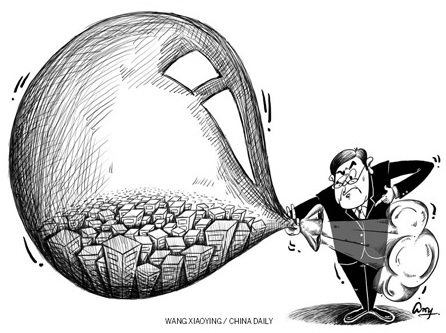Opinion
Remedies for real estate prices in need of oversight committee
By Chan Choi-hi (China Daily)
Updated: 2010-03-02 14:30
 |
Large Medium Small |
The central government has taken the soaring real estate prices seriously. To provide people with more affordable housing, stabilize the realty market and solve the existing and potential problems in the sector, the government has taken five measures. They are: Increasing supply of low-cost houses for low-income families, encouraging reasonable house buying while restraining purchase for speculation and investment, strengthening real estate project loan risk management and market supervision, expediting the construction of protected homes, and specifying responsibilities of local governments.
But are these measures enough to tackle the problems of the property market? Or, should more be done?
Local officials, financial institutions and property developers have formed an "unholy alliance" in the realty sector. They maneuver within the system to exploit it. Most of the time they get what they want, ending up with huge profits. They complement each other in unscrupulous deals and thus hamper the stability of the real estate sector.
Local interests play a big role in determining the property market. Officials transfer land use rights to enrich local government coffers and/or promote their personal careers. So it is important to fix the crux of the problem in order to stabilize the realty market.
The ill-gotten wealth accumulated by unscrupulous developers and corrupt or overambitious officials will aggravate the country's poverty problem. It will widen the rich and the poor divide further, and could cause social and political problems. In short, if the central government does not check the situation, the control of the real estate market could fully pass on to the "unholy alliance".
The central government's policies should be consistent and focus on consistency to arrest the runaway property prices and ensure that the realty market develops in a healthy and orderly way. If the government does not rein in the property sector, it could grow into a "monster" holding not only the economy at ransom, but also the entire society.
The central government has to have a comprehensive plan to prevent that from happening. It already has all the tools it needs to prevent bubbles from being created in the property market. Now it just needs to use them effectively. That is the demand of the people - and that is what the government has to do to prevent the situation from worsening and snowballing into social unrest.
Since the coordination of different government departments (from central to local) is needed to solve the real estate problem, the central government should set up a working team, headed by a high senior official, to oversee the implementation of the rectification measures. This is important to ensure that all the proposed measures are implemented timely and effectively.
But the realty problem is not only economic. It is a social and political problem, too. Hence, it can't be solved without the help of political and social policies.
That brings us to the need for a sustainable housing policy in China. Like anywhere else in the world, providing affordable houses to the poor and low-income families in China is the responsibility of the Chinese government. The role of the central government is mainly to pass and supervise the implementation of the housing policies and regulations, and to set up a foolproof monitoring system.
Family incomes, for example, could be used as the best criterion to determine the number of households in need of low-price houses. But there has been no nationwide survey to find out how many households fall in this category. It's high time the government undertook such a survey that, for example, could begin from cities with a population of more than five million.
The author is chairman of Hong Kong Public Governance Association and member of Hong Kong's Central and Western District Council.














